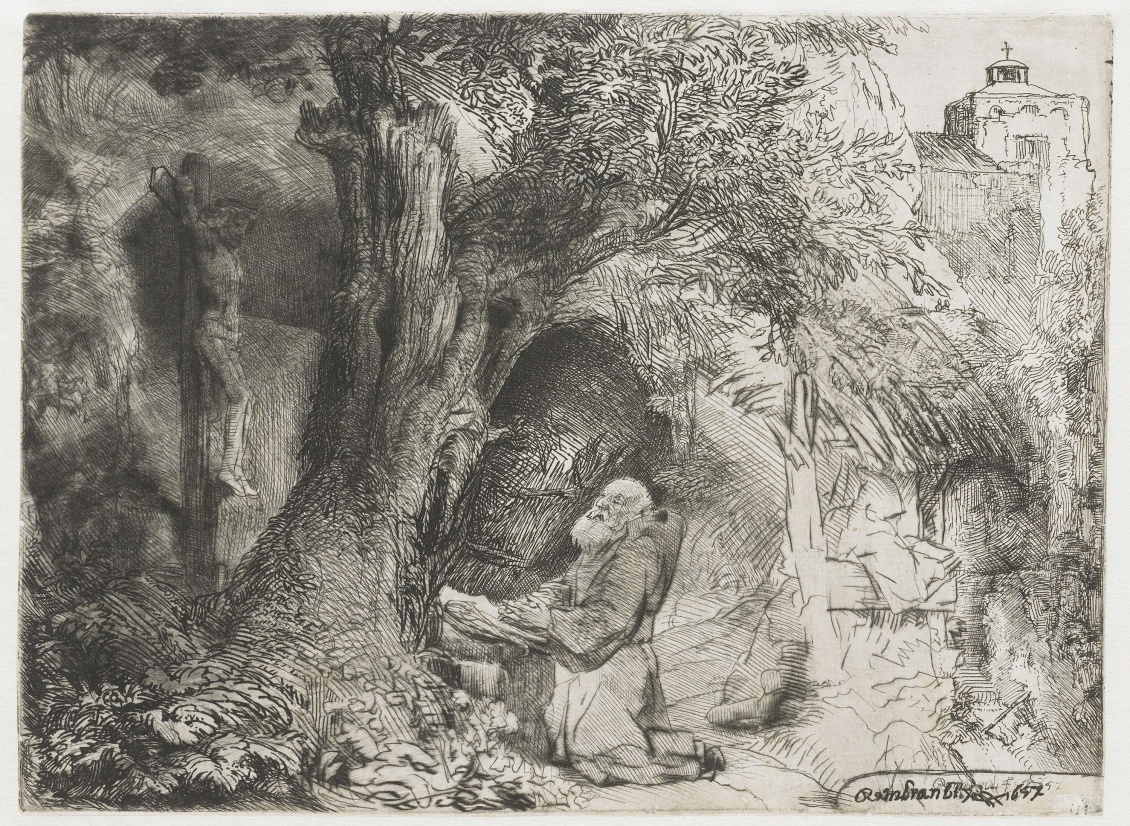Prayers for Creation
Saint Francis beneath a Tree, Praying, Rembrandt Harmensz. van Rijn, 1657. Courtesy Rijksmuseum.
Pope Francis has named today, September 1, as the World Day of Prayer for the Care of Creation. In honor of this day, two great people of prayer come to mind: St. Francis, the Pope’s namesake, and Malcolm Boyd, the priest and civil rights activist who died earlier this year. I’ve pulled brief selections from them both.
St. Francis of Assisi (1182-1226). The “Canticle for the Sun” of St. Francis is a well-known classic, with “our sister the moon” and “brother the wind.” It bears repeating here in full:
O most High, almighty, good Lord God,
to you belong praise, glory, honor, and all blessing!
Praised be my Lord God with all creatures;
and especially our brother the sun,
which brings us the day, and the light;
fair is he, and shining with a very great splendor:
O Lord, he signifies you to us!
Praised be my Lord for our sister the moon,
and for the stars,
which God has set clear and lovely in heaven.
Praised be my Lord for our brother the wind,
and for air and cloud, calms and all weather,
by which you uphold in life all creatures.
Praised be my Lord for our sister water,
which is very serviceable to us,
and humble, and precious, and clean.
Praised be my Lord for brother fire,
through which you give us light in the darkness:
and he is bright, and pleasant, and very mighty,
and strong.
Praised be my Lord for our mother the Earth,
which sustains us and keeps us,
and yields diverse fruits,
and flowers of many colors, and grass.
Praised be my Lord for all those who pardon
one another for God’s love’s sake,
and who endure weakness and tribulation;
blessed are they who peaceably shall endure,
for you, O most High, shall give them a crown!
Praised be my Lord for our sister,
the death of the body,
from which no one escapes.
Woe to him who dies in mortal sin!
Blessed are they who are found walking
by your most holy will,
for the second death shall have no
power to do them harm.
Praise you, and bless you the Lord,
and give thanks to God, and serve God
with great humility.
Malcolm Boyd (1923-2015). Are You Running with Me, Jesus? and other books of Malcolm’s prayers echo the earthy at-one-ness of Francis. But when he wrote or spoke about nature, Malcolm was most inclined to focus on trees. Malcolm loved trees.
Though not properly a prayer, here’s a Lenten reflection from 2013 that he wrote for the Huffington Post that is equally appropriate as a prayer for a day like this.
Malcolm begins like he does in so many of his prayers, with the concrete and everyday.
Yes, we’re here again, the tree and I. This is such a holy place for me. I feel the closeness of the tree….
We don’t get into traditional or customary conversations. Trees, I’ve learned, don’t use words. Actually I don’t use them either….
Slowly, the tree quietly reminds me it has lived through every kind of season and vicissitude. It has accepted these with patience along with hot sun, cold wind and rain. So the tree is bearing witness to patience.
Malcolm was for a long time a resident of Los Angeles. At the latter part of his life I don’t think he felt he could live anyplace else. But he felt the rawness and pain of the city deeply:
I want to talk to the tree about this….The tree and I are looking at one another closely. I am struck by its seamless memory and sense of peace. But the world — in this moment of my own consciousness — seems to hold so little peace! Seated here in reflection, I try to shut out stark and terrible images of torture, despair, rape, violence, chaos, murder, egomania, empire run amok and ruin.
I cannot shut them out. These images stun my vision.
The tree does not move. It simply remains here with me. The tree is wiser than I am, more of a survivor. The tree is obdurate, faithful to a fault, utterly experienced, obviously rooted in ways that I am not.
I never saw a person hug a tree like Malcolm would. It was more than a hug; it was an expression of being in this together. “I see that I am (with the tree) a part of the world,” he wrote.
Gazing at the tree, I come to realize it isn’t simple at all but is immensely complex. This gives us something to share. Its branches zigzag all over the place, devoid of any kind of neat pattern. This tree contradicts any easy formula for perfection. Many other trees are far more elegant, even stunning. This one isn’t conventionally attractive at all. On the other hand, I’d give it an A for character….
In another moment I won’t be seated here anymore. I’ll get up and move away. I hope I’ll be back. Wouldn’t that be great? To be with my good and old friend again.
To read the entire piece, go here.
